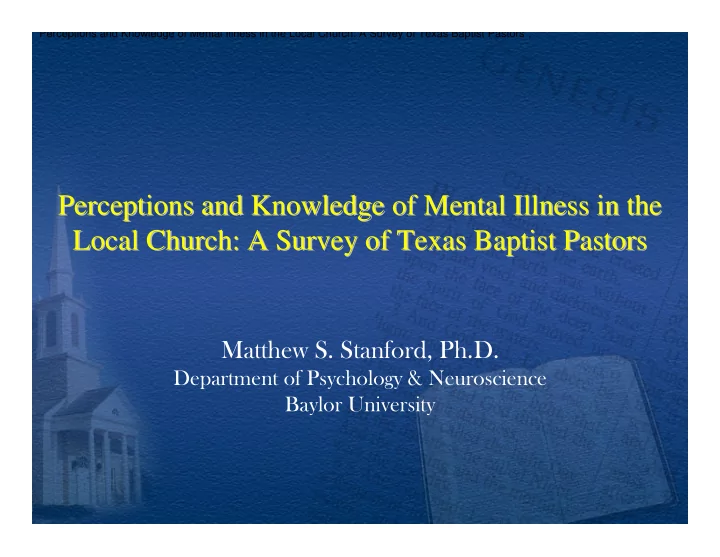

Perceptions and Knowledge of Mental Illness in the Local Church: A Survey of Texas Baptist Pastors , Perceptions and Knowledge of Mental Illness in the Perceptions and Knowledge of Mental Illness in the Local Church: A Survey of Texas Baptist Pastors Local Church: A Survey of Texas Baptist Pastors Matthew S. Stanford, Ph.D. Department of Psychology & Neuroscience Baylor University
Mental Disorder Statistics Mental Disorder Statistics � An estimated 26.2% of Americans (57.7 million people) ages eighteen and older (one in four adults) suffer from a diagnosable mental disorder in a given year. � Mental disorders are the leading cause of disability in the United States and Canada for ages 15-44. � The economic costs of mental illnesses are significant as well: recent figures indicate that the indirect cost of mental illnesses in the U.S. (due primarily to lost productivity and early morbidity) exceeds $72 billion annually.
Mental Illness and the Religious Community Mental Illness and the Religious Community � Individuals experiencing psychological distress are more likely to seek help from clergy before any other professional group. � The “gatekeeper model” suggests that clergy will recognize the presence of mental illness in a congregant and make an appropriate mental health referral. � Religious support offers the psychologically distressed individual resources that are unavailable through more general social support. � Research has shown that religious social support can play a key role in recovery from psychiatric illness. Chalfant et al., 1990; Fiala et al., 2002; Fitchett et al., 1997; Lindgren & Coursey, 1995; Yangarber-Hick, 2004
Previous Research Previous Research � The Christian community is denying or dismissing the mental disorders of a significantly large number of congregants (approximately 30-40% of those who seek assistance). � There appears to be no difference in the severity of disorder or strength of faith between individuals whose mental illness is dismissed and those whose illness is not dismissed. In fact, individuals whose disorder was dismissed attended church significantly more often. � Conservative and/or charismatic (Spirit-filled) churches are more likely to attribute the cause of a mental or behavioral problem to spiritual factors (e.g., sin, personal faith, demonic activity) and are thus more likely to dismiss the diagnosis of a mental disorder. � The mental disorders of women are more frequently dismissed by the church when compared to the same diagnoses in men. Stanford, 2007; Stanford & McAlister, 2008
Survey of BGCT Pastors Survey of BGCT Pastors Baptist General Convention of Texas (BGCT) senior pastors were contacted through emails provided by the BGCT and surveyed via an online questionnaire. One week and one month follow-up emails we sent after the initial contact. Response Rate: 999 contacts , 168 responses (16.8%) Response Rate: 999 contacts , 168 responses (16.8%)
Sample Demographics Sample Demographics Avg. Size: 939 (median 500) Avg. Size: 939 (median 500) Avg. Annual Budget: $1,036,800 (median $500,000) Avg. Annual Budget: $1,036,800 (median $500,000) Avg. Pastor Age: 48.2 years (median 47.5) Avg. Pastor Age: 48.2 years (median 47.5) Avg. Years in Ministry : 19.0 years (median 17.5) Avg. Years in Ministry : 19.0 years (median 17.5) Pastor Ethnicity: 89.9% Caucasian, 10.1% Minority Pastor Ethnicity: 89.9% Caucasian, 10.1% Minority Pastor Education: 33.3% Doctorate, 86.9% Master’ ’s , 8.9% Bachelor s , 8.9% Bachelor’ ’s s Pastor Education: 33.3% Doctorate, 86.9% Master Church Setting: 50.0% Suburban, 29.8% Rural, 20.2% Urban Church Setting: 50.0% Suburban, 29.8% Rural, 20.2% Urban Theology 3.14 (1=very conservative, 10=very liberal) Theology 3.14 (1=very conservative, 10=very liberal) Seminar or course on 53.6% (Yes) Seminar or course on 53.6% (Yes) mental illness mental illness
Preliminary Results Preliminary Results Avg. Response General Knowledge of Mental Illness 5.73 (1=very little, 10=very knowledgeable) Counselees Diagnosed with a Mental Illness 2.68 (1=not often, 10=very often) Likely to Refer to a (1=not likely, 10=very likely) Christian Mental Health Care Provider 8.55 Non-Christian Mental Health Care Provider 3.03 Likely to Participate in a Seminar on Mental Illness 6.27 (1=not likely, 10=very likely)
Preliminary Results Preliminary Results
Preliminary Results Preliminary Results
Preliminary Results Preliminary Results
Recommend
More recommend